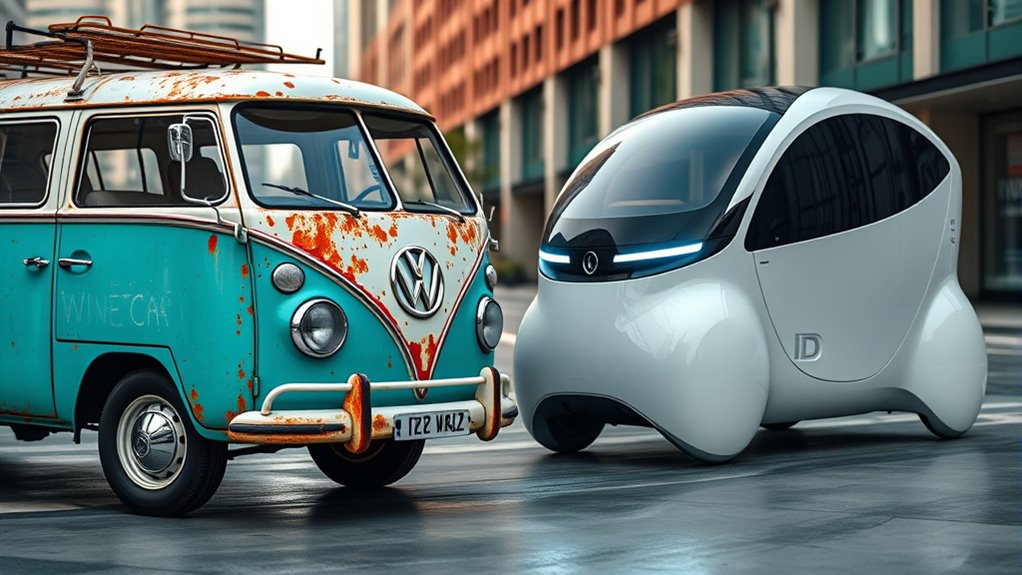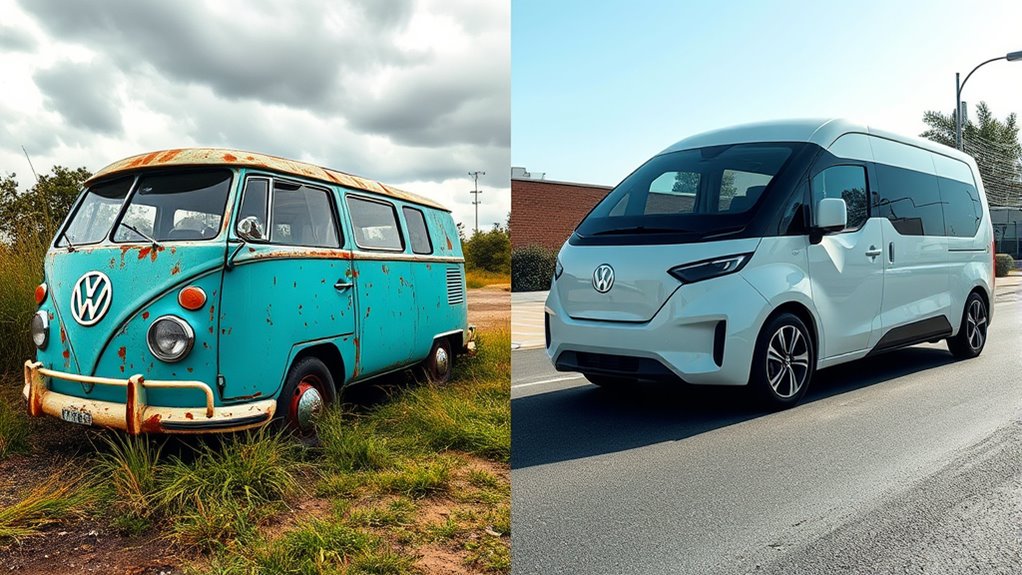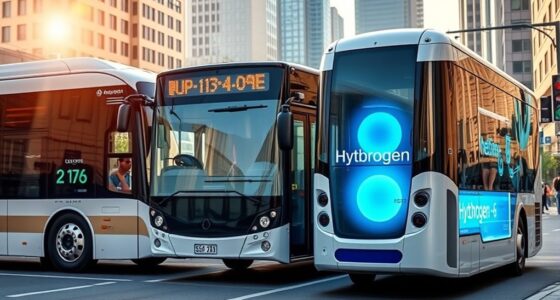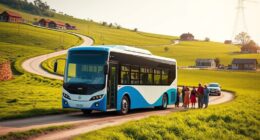Owning a classic VW Bus typically costs more over time because of restoration needs, frequent repairs, and higher insurance premiums. You’ll spend more on parts, bodywork, and maintenance, especially if the vehicle has been neglected. In contrast, the electric ID Buzz has lower ongoing expenses due to its simpler electric motor, fewer repairs, and lower energy costs. To see how these factors compare in detail, keep exploring what makes each option unique.
Key Takeaways
- Restoration and parts for vintage VW Buses can cost thousands, while the ID Buzz benefits from lower, predictable repair expenses.
- Classic VW Buses typically incur higher insurance premiums due to their collectible status; the ID Buzz qualifies for standard, often cheaper coverage.
- Maintenance for vintage models involves frequent, costly repairs; the ID Buzz’s electric powertrain requires less upkeep and fewer repairs.
- Fuel costs for classic VW Buses fluctuate and are generally higher; electric charging for the ID Buzz is more stable and often cheaper.
- Overall ownership expenses, including repairs, insurance, and fuel, tend to be significantly lower for the ID Buzz compared to a restored vintage VW Bus.

Deciding between a classic VW Bus and the modern ID Buzz depends heavily on your budget and priorities. When it comes to ownership costs, the differences can be significant. For starters, restoration expenses play a major role in the long-term financial picture. Classic VW Buses often require ongoing repairs and restoration to keep them running smoothly. Parts for vintage models can be hard to find, and restoring them to their original condition can be costly and time-consuming. You might spend thousands on bodywork, engine rebuilds, or interior refurbishments, especially if the bus has been neglected over the years. These expenses can add up quickly, making a vintage VW Bus a more expensive investment over time.
Insurance premiums are another key consideration. Classic vehicles usually carry higher insurance costs because they’re considered collectibles. Insurers often see vintage VW Buses as higher risk, especially since they’re older and less reliable than modern vehicles. If you opt for a classic, you might need specialized coverage, which can be more expensive. On the other hand, the ID Buzz, being a new electric vehicle, typically qualifies for standard insurance policies. It benefits from modern safety features, advanced technology, and a lower risk profile, which can translate into lower premiums. Plus, some insurance companies offer discounts for electric vehicles, further reducing the cost.
Maintenance and repair costs also differ substantially. The vintage VW Bus relies on a traditional internal combustion engine, which requires regular tune-ups, oil changes, and part replacements. Over time, these maintenance needs can add up, especially if you’re fixing older components or upgrading parts to improve reliability. Conversely, the ID Buzz’s electric powertrain requires less maintenance overall. There’s no oil to change, fewer moving parts, and the technology is designed for longer intervals between service visits. This can save you money and hassle in the long run.
Fuel costs are another factor. Classic VW Buses consume gasoline, which can be expensive and fluctuates in price. The ID Buzz, being electric, can be charged at home or at charging stations, often at a lower cost per mile. This means lower ongoing expenses for energy, especially if you have access to home solar power or affordable charging options.
Frequently Asked Questions
How Does Maintenance Frequency Differ Between the Two Models?
You’ll find maintenance frequency differs considerably between the two models. The classic VW Bus typically requires more frequent maintenance and repairs, leading to higher repair costs over time. In contrast, the ID Buzz, being electric, needs less maintenance due to fewer moving parts and no oil changes. This means you’ll spend less time and money on repairs, making the ID Buzz more convenient and cost-effective in the long run.
Are There Tax Incentives for Owning an Electric ID Buzz?
Owning an electric ID Buzz is like opening a treasure chest of savings! You may qualify for tax incentives and government rebates that markedly cut your costs. These perks are designed to encourage eco-friendly driving, reducing your overall expenses. While these incentives vary by location, they can make the switch to electric more affordable, helping you enjoy the benefits of modern technology while saving money in the long run.
What Are the Long-Term Resale Values of Both Vehicles?
You wonder about the long-term resale values of both vehicles. Historically, vintage VW buses tend to appreciate due to their iconic vintage appeal, making them potential collectibles. In contrast, electric vehicles like the ID Buzz may hold steady or slightly depreciate initially but could gain value with increasing electric vehicle demand and technological advancements. Your choice depends on whether you value classic charm or future-proof innovation.
How Does Insurance Cost Compare for the Classic vs. Electric Bus?
When comparing insurance premiums, you’ll find that insuring a classic VW Bus often costs more due to its age, rarity, and higher repair costs, which can affect your overall cost coverage. Electric buses like the ID Buzz usually have lower premiums because they’re newer, safer, and cheaper to repair. Keep in mind that coverage options vary, so shopping around can help you find the best deal for your specific needs.
What Environmental Impacts Are Associated With Each Vehicle?
Think of each vehicle as a story of environmental impact. The classic VW Bus has a larger carbon footprint due to older engines and higher emissions, and resource extraction for parts can be more damaging. In contrast, the ID Buzz’s electric power reduces emissions, but its batteries involve resource extraction, which impacts ecosystems. Overall, the electric bus offers a cleaner ride, but both vehicles leave environmental footprints.
Conclusion
Ultimately, owning a classic VW bus is like holding onto a piece of history, each dent and rust telling stories of the past. The ID Buzz, however, symbolizes the future—clean, efficient, and ready to lead the way forward. Your choice reflects what you value: nostalgic charm or innovative progress. Whichever you choose, remember, you’re steering more than a vehicle—you’re guiding a legacy into tomorrow’s road.









